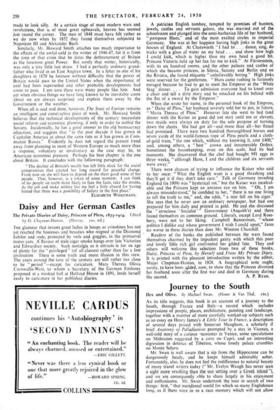Daisy and Her German Castles
The Private Diaries of Daisy, Princess of Pless, 18)3-1914. Edited by D. Chapman-Huston. (Murray. los. 6d.)
THE glamour that invests great ladies in hoops or crinolines has not yet reached the hostesses and beauties who reigned at the Diamond Jubilee and rode, protected by veils and goggles, in the primaeval motor cars. A' flavour of stale cigar smoke hangs over late Victorian and Edwardian society. Such nostalgia as it attracts is for an age of plenty for the " privileged " (of all classes) rather than for a lost civilisation There is some truth and more illusion in this view. The years around the turn of the century are still rather too close to be "period "—except for caricature. Mary Theresa Olivia Cornwallis-West, to whom a Secretary of the German Embassy proposed at a masked ball at Holland House in 1891, lends herself easily to caricature in her published diaries.
A patrician English tomboy, tempted by promises of hunters, jewels, castles and servants galore, she was married out of the schoolroom and plunged into the semi-barbarian life of her husband, "pompous Hans," and of the most exalted circles in imperial Germany. She was at her happiest having high jinks in the great houses of England. At Chatsworth "I had to . . . dance, sing, do tricks with a glass of water on my head . . . and show how high I could kick, which is higher than my own head a good bit. Princess Victoria held up her fan for me to kick." At Ftirstenstein, with its six hundred rooms, and the other palaces and castles of which she became princess, in Silesia, Saxony and Berlin and on the Riviera, she found etiquette "unbelievably boring." High jinks were reserved for the gentlemen. "Hans came rushing in furiously enraged because he had to go to meet the Emperor at the 'White Stag' dinner. . . . To gain admission everyone had to kneel over a chair and tell a dirty story and be smacked on his behind with the flat of a sword by the Emperor."
When she wrote her name, in the personal book of the Empress, as "Daisy of Pless," her husband severely told her to put, in future, "Maria Theresa of Pless." However late she went to bed (and dinner with the Kaiser as guest did not start until ten or eleven), two maids were always on duty for the sole purpose of turning down the sheets. She had got all—and more than all—her fiancé had promised. There were two hundred thoroughbred horses and seven yards of the world-famous rope of Pless pearls and a cloth- of-gold train, "the one which, without my knowing it, cost f400," and, among others, a " best " crown and innumerable Orders. Sometimes the housekeeping, even on this scale, had its bad moments. She discovered that the chef had bought 991 eggs in three weeks, "although Hans, I and the children and six servants were away."
There were chances of trying to influence the Kaiser who said to her once: "What the English want is a good thrashing and they'll get it if they don't take care." Talk of Germany invading England (in 1909) was "hysterical rot," but the Kaiser was incalcul- able and the Princess kept an anxious eye on him. "Oh, I am always misunderstood," he confided to her, "there is no one living to tell the truth to me," and, she adds, "a tear fell on his cigar." She says that he never saw an ordinary newspaper, but had one prepared for him daily and printed in gold. He and she discussed the "atrocious 'Socialist'" Government (Asquith's) and there found themselves on common ground. Liberals, except Lord Rose- bery, were not to her liking. Campbell Bannerman, "whose politics I dislike and whose government I wish I could upset," fares no worse in these diaries than does Mr. Winston Churchill.
Readers of the books she published between the wars found themselves charmed by the impudent gaiety with which this poor and lovely little rich girl confronted her gilded fate. They and others will welcome this selection from two of these books, Daisy. Princess of Pless, by Herself and From My Private Diary. It is printed with the pleasant introduction written by the editor, Major Chapman-Huston, in 1928. A biographical note ought, surely, to have been a4flded, now, to show that the Princess divorced her husband soon after the first war and died in Germany during


































 Previous page
Previous page